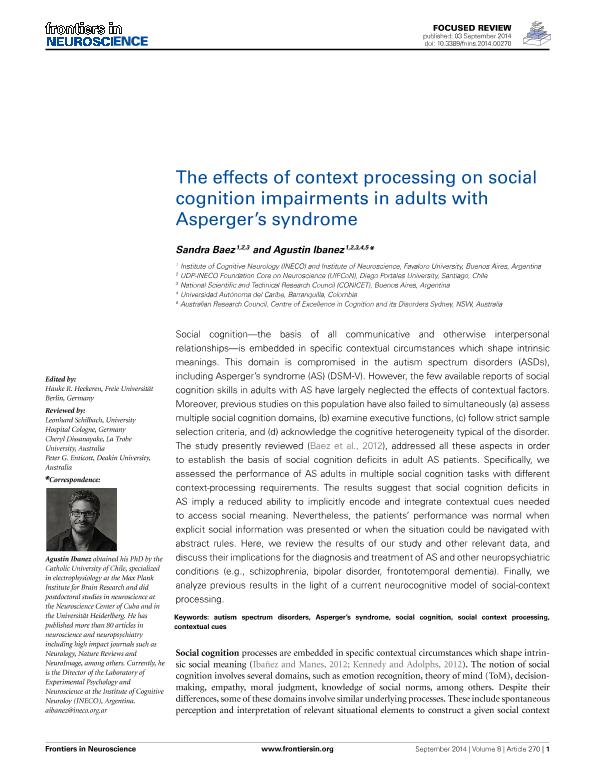Mostrar el registro sencillo del ítem
dc.contributor.author
Báez Buitrago, Sandra Jimena

dc.contributor.author
Ibañez, Agustin Mariano

dc.date.available
2020-05-14T14:40:44Z
dc.date.issued
2014-09
dc.identifier.citation
Báez Buitrago, Sandra Jimena; Ibanez Barassi, Agustin Mariano; The effects of context processing on social cognition impairments in adults with Aspergers syndrome; Frontiers Media S.A.; Frontiers in Neuroscience; 8; 270; 9-2014; 1-9
dc.identifier.issn
1662-453X
dc.identifier.uri
http://hdl.handle.net/11336/105109
dc.description.abstract
Social cognition—the basis of all communicative and otherwise interpersonal relationships—is embedded in specific contextual circumstances which shape intrinsic meanings. This domain is compromised in the autism spectrum disorders (ASDs), including Asperger’s syndrome (AS) (DSM-V). However, the few available reports of social cognition skills in adults with AS have largely neglected the effects of contextual factors. Moreover, previous studies on this population have also failed to simultaneously (a) assess multiple social cognition domains, (b) examine executive functions, (c) follow strict sample selection criteria, and (d) acknowledge the cognitive heterogeneity typical of the disorder. The study presently reviewed (Baez et al., 2012), addressed all these aspects in order to establish the basis of social cognition deficits in adult AS patients. Specifically, we assessed the performance of AS adults in multiple social cognition tasks with different context-processing requirements. The results suggest that social cognition deficits in AS imply a reduced ability to implicitly encode and integrate contextual cues needed to access social meaning. Nevertheless, the patients’ performance was normal when explicit social information was presented or when the situation could be navigated with abstract rules. Here, we review the results of our study and other relevant data, and discuss their implications for the diagnosis and treatment of AS and other neuropsychiatric conditions (e.g., schizophrenia, bipolar disorder, frontotemporal dementia). Finally, we analyze previous results in the light of a current neurocognitive model of social-context processing.
dc.format
application/pdf
dc.language.iso
eng
dc.publisher
Frontiers Media S.A.

dc.rights
info:eu-repo/semantics/openAccess
dc.rights.uri
https://creativecommons.org/licenses/by/2.5/ar/
dc.subject
AUTISM SPECTRUM DISORDERS
dc.subject
ASPERGERS SYNDROME
dc.subject
SOCIAL COGNITION
dc.subject
SOCIAL CONTEXT PROCESSING,
dc.subject
CONTEXTUAL CUES
dc.subject.classification
Otras Psicología

dc.subject.classification
Psicología

dc.subject.classification
CIENCIAS SOCIALES

dc.title
The effects of context processing on social cognition impairments in adults with Aspergers syndrome
dc.type
info:eu-repo/semantics/article
dc.type
info:ar-repo/semantics/artículo
dc.type
info:eu-repo/semantics/publishedVersion
dc.date.updated
2020-05-11T15:11:38Z
dc.journal.volume
8
dc.journal.number
270
dc.journal.pagination
1-9
dc.journal.pais
Suiza

dc.description.fil
Fil: Báez Buitrago, Sandra Jimena. Consejo Nacional de Investigaciones Científicas y Técnicas. Oficina de Coordinación Administrativa Houssay. Instituto de Neurociencia Cognitiva. Fundación Favaloro. Instituto de Neurociencia Cognitiva; Argentina. Universidad Diego Portales; Chile
dc.description.fil
Fil: Ibanez Barassi, Agustin Mariano. Consejo Nacional de Investigaciones Científicas y Técnicas. Oficina de Coordinación Administrativa Houssay. Instituto de Neurociencia Cognitiva. Fundación Favaloro. Instituto de Neurociencia Cognitiva; Argentina. Universidad Diego Portales; Chile. Universidad Autónoma del Caribe; Colombia. Australian Research Council; Australia
dc.journal.title
Frontiers in Neuroscience
dc.relation.alternativeid
info:eu-repo/semantics/altIdentifier/url/https://www.frontiersin.org/articles/10.3389/fnins.2014.00270/full
dc.relation.alternativeid
info:eu-repo/semantics/altIdentifier/doi/http://dx.doi.org/10.3389/fnins.2014.00270
Archivos asociados
